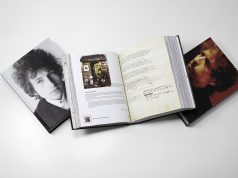
A uniform solidifies a sense of sameness, but as Helen Thorpe set out to write her latest book, Soldier Girls, she realized that behind the uniform, experiences are anything but alike.
“I’ll never look at somebody in a uniform and make assumptions about them again,” Thorpe says. “I think that it’s easy to see someone wearing a uniform and imagine and therefore think you know a lot about that person, and you can guess how they vote or what their thoughts are. … But you can’t just assume you know anything about them as an individual.”
Soldier Girls tells the story of Debbie Helton, Michelle Fischer and Desma Brooks. The women joined the Indiana National Guard for a variety of reasons — one had a strong military tradition in her family, another had dreams of higher education to finance and the third joined on a dare. But all were in the Guard on Sept. 11, 2001, and each went on to serve abroad in Afghanistan or Iraq. The women differed in age, background, political views — from supporting the wars to one who voted for Ralph Nader — and family status — one a single mother of three. One has since survived an I.E.D. roadside bomb attack and suffered post-traumatic stress disorder, and the others faced different challenges when returning home. Soldier Girls details more than a decade of their lives serving in the military, from joining up to being deployed to readjusting to civilian life, through life struggles including relationships, boredom, fear and the hardships of being away from children.
The idea for the book started several years ago, when military personnel were returning from deployment. Thorpe says she became interested in how they were reacclimating to civilian society and the clear separation that existed between the civilian and military worlds.
“The whole time the Iraq and Afghanistan conflicts were happening, I realized civilians like myself weren’t really engaged,” she says. “It seemed really disturbing to me that you could have a decade of war and then a big part of the population feeling disengaged from it. … As the conflicts dragged on and on, people got tired of the story and turned away from it because they wished it wasn’t happening.”
Thorpe set out to do informational interviews with veterans and stumbled upon these three women who had served in the Guard and had forged a friendship. Thorpe wrote the book over a four-year span and pieced together their stories through interviews, diary entries, doctor’s records, therapy notes, letters, emails, social media posts, daily battalion newsletters and more.
When Thorpe talks about the three women, she draws clear distinctions between them. Since each is so different, it’s difficult to make sweeping statements that encompass their time in the military or their thoughts and feelings since being home. But with the title Soldier Girls, it’s obvious gender was a significant factor for all of them. For example, Helton had enlisted in the ’80s and was one of the first groups of women to integrate into her Guard unit. She served up until a few years ago, and now the numbers of women in the military are growing and the roles women can serve are broadening.
Of course, even as conditions are improving, each woman still faced some gender discrimination. Thorpe says she was surprised to find out about some of the problems women dealt with, including harassment from other soldiers, double standards and lowered expectations.
“I honestly did not know the extent to which women in the military are still overcoming barriers and hurdles that, in civilian society, we think of having being overcome a long time ago,” she says. “I didn’t understand that the battle of equality is still taking place in such a daily way as I saw it play out in their lives.”
Thorpe says the strength and weakness of her book is that she interviewed three individuals. While she wrote a book about women in the military, she says she is by no means an expert on the topic. She hopes that veterans will be able to relate to her book, and also that civilians will see there are a variety of different narratives taking place in the military.
“Hundreds of thousands of women have deployed in the last decade,” Thorpe says. “On the civilian side of the equation, who we think of as a soldier or sailor or Marine hasn’t caught up with reality. There are all kinds of women’s stories playing out in the military.”
ON THE BILL: Helen Thorpe: Soldier Girls. 7:30 p.m. Tuesday, May 5, Chautauqua Community House, 900 Baseline Road, Boulder, 303-440-7666. Tickets $7-10.














